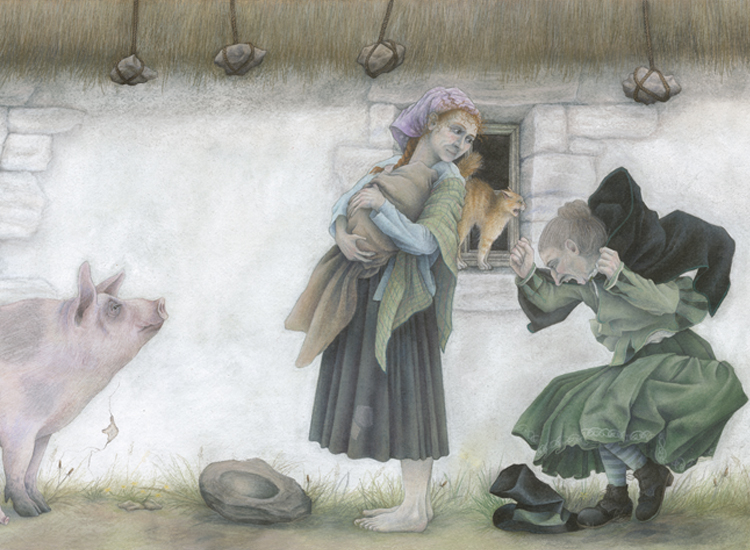
We saw Brave in the theater last weekend. I have to say I loved it. Merida is quite the princess, good with a bow and arrow, free spirited and adventurous, but still teenager enough to think she can make a deal with a witch. All of us who read fairy tales know that’s a bad, bad idea. Happily it all works out in the end, with Merida and her mother learning a lot about themselves, about each other, and about what’s truly important.
I thought today I’d share another story about a woman in Scotland who makes a deal she shouldn’t, but in this case it’s with a fairy, “Whuppity Stoorie.”
A woman’s husband went to the fair and never returned; she was left alone with her baby son and owning only a big sow. The Goodwife was poor and alone, for although the whole village was sorry for her, no one would help her. The sow was about to have piglets, and she hoped for a good litter, but one day she went to the pen to find the sow dying. She was devastated, but right at that moment a woman in green comes up the hill from the woods. The wife started to tell her sad tale, but the Green Lady interrupted and said she already knows. I think the wife should have been suspicious at this point, but they never are. The Green Lady asked what the woman will give her if she cures the sow. “‘Anything you like,'” said the stupid Goodwife, not guessing who she had to deal with.” The Green Lady saved the sow and demanded the baby in return. The Goodwife gave a shriek, realizing she was dealing with a fairy. Though she would not listen to any pleas, the Green Lady told the woman that under the fairy laws, she had to wait three days before taking the baby, and the woman could stop her by telling her her name. Notice that magical three again. The woman was distraught and couldn’t sleep that night, but the next day she went for a walk in the woods. She finds an old quarry overgrown by grass with a spring in the middle of it. There she sees the fairy spinning and singing.
“Little kens our guide dame at hame
That Whuppity Stoorie is my name”
When the fairy came the third day, the woman decided to have some fun at the fairy’s expense. She pled with the fairy to take the sow, and then to take herself. The fairy scorned her, asking what she would want with such a woman. “‘I might have known,” said she, “that the likes of me isn’t fit to tie the shoe-strings of the high and might fairy Whuppity Stoorie!”
The name made the fairy leap high. Down she cam again, dump on her heels, and whirling round, she ran down the hill like an owlet chased by witches.”
The woman takes her baby back home, laughing. I don’t know that she lived happily every after, but at least she was happy that day.
The story’s quite similar to “Rumpelstiltskin,” but this woman’s predicament in the beginning is not of her own making, or a result of her father’s bragging. She has found herself in a vulnerable, desperate situation. She’s poverty-stricken, her husband’s abandoned her and their child. Who can really blame her for being tricked into making the bargain? I like that she’s the one who finds out the name though, not some royal messenger. She saves her son. In that way, it’s an encouraging story, since the wife prevails in the end with no help from husband or neighbors.
The story can be found several places. I read it in Fearless Girls, Wise Women & Beloved Sisters: Heroines in Folktales from Around the World by Kathleen Ragan, a book I love. I’m so happy someone gave it to Amber for her birthday last winter.
Thursday’s Tales is a weekly event here at Carol’s Notebook. Fairy tales, folktales, tall tales, even re-tellings, I love them all.

A nice story, thanks for sharing – indeed similar to “Rumpelstiltskin”.
I am loving the word Whuppity!!!
I have not heard this one before 😀